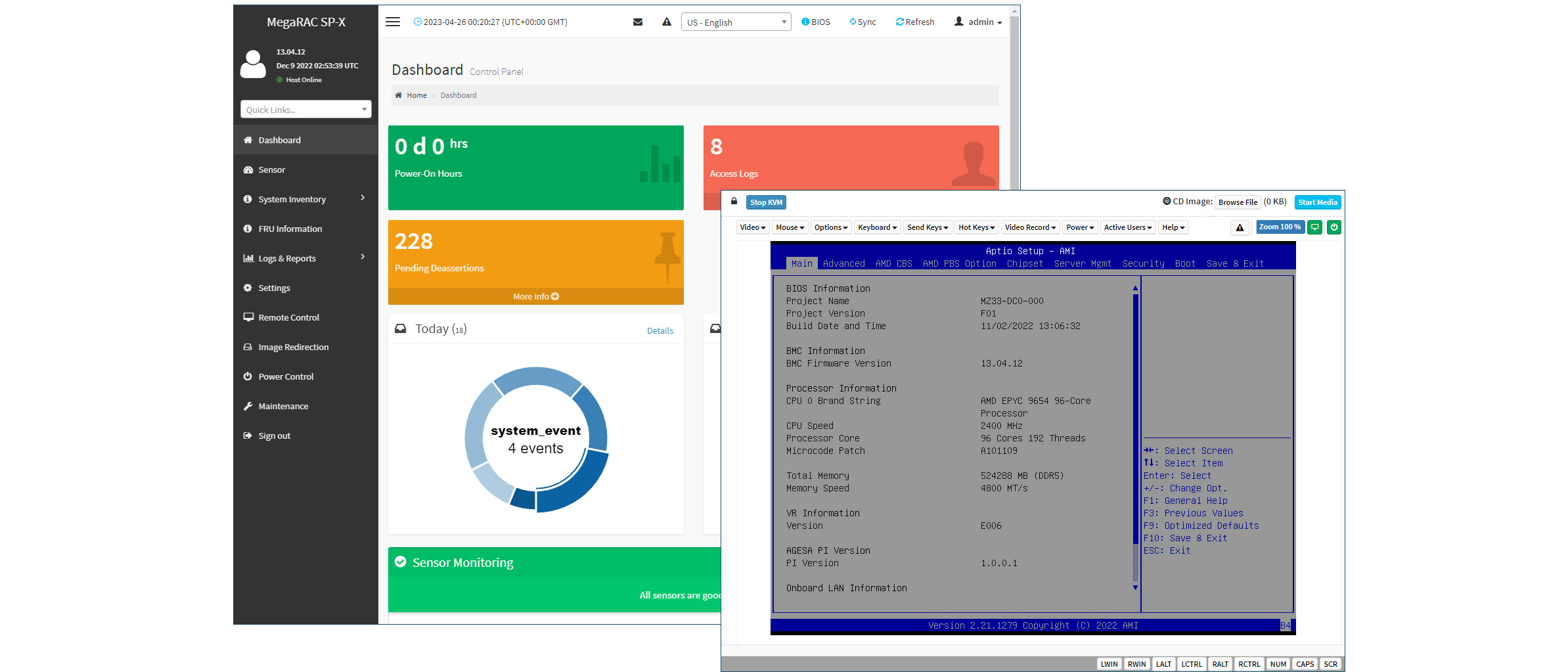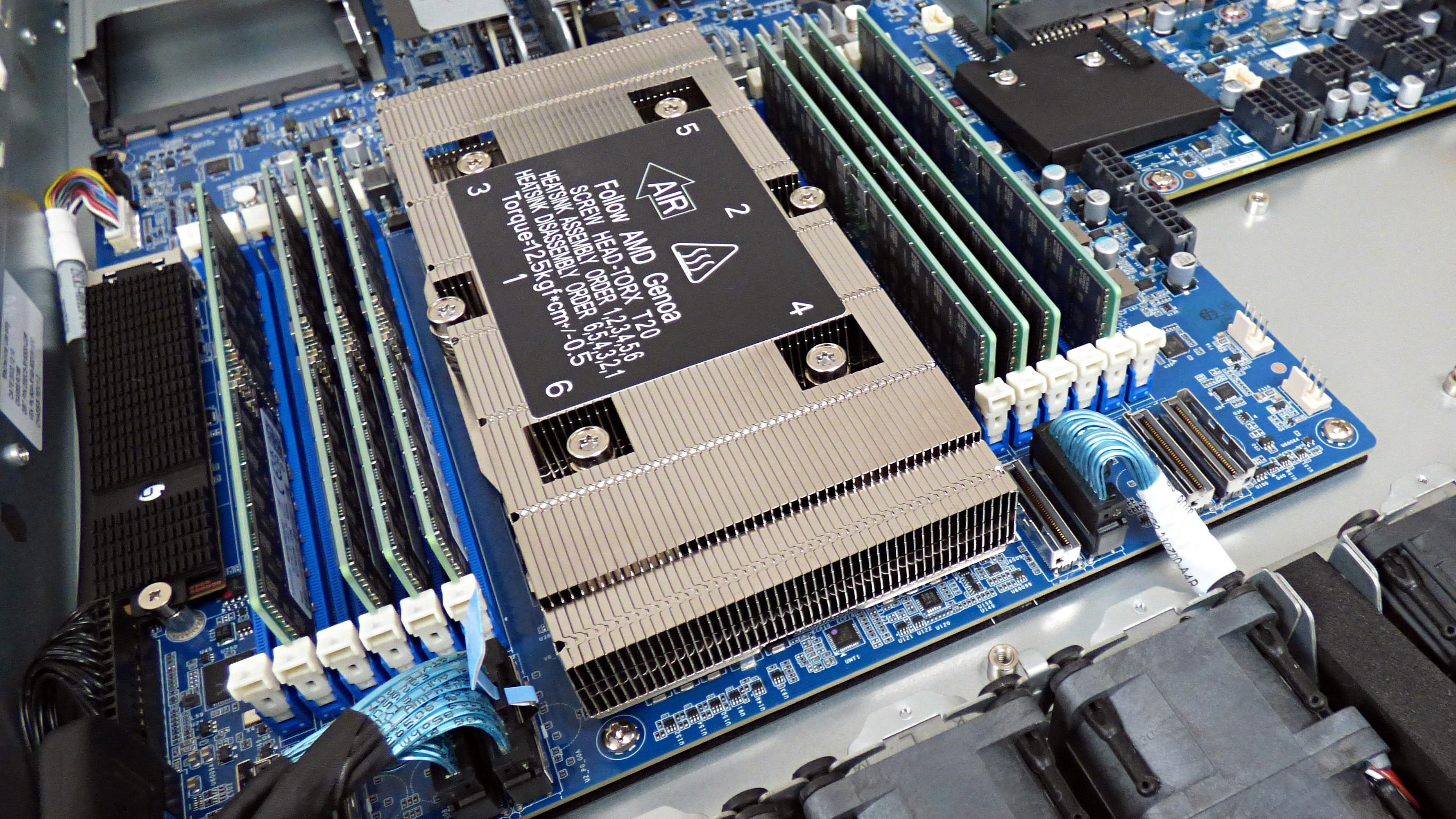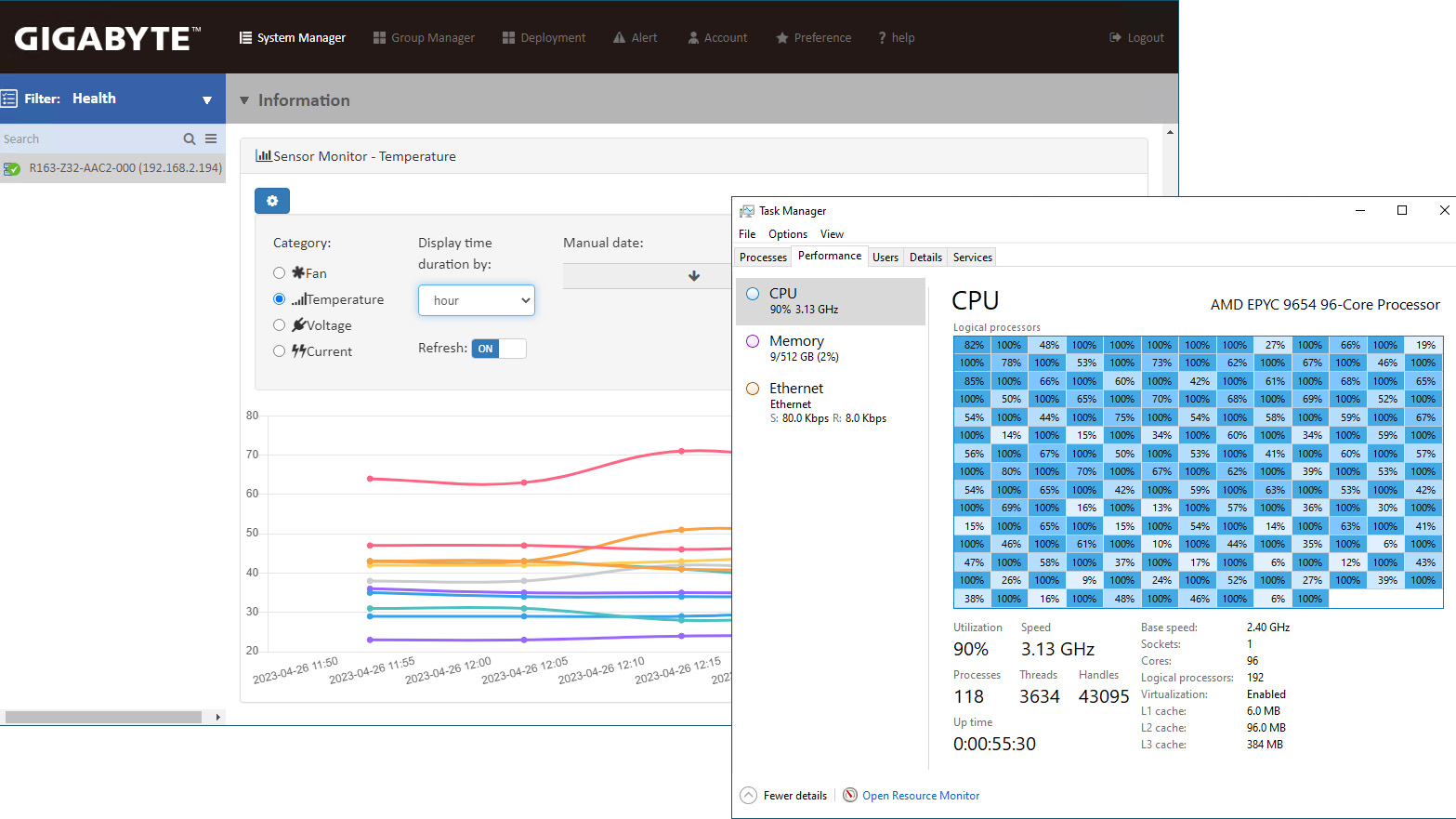Broadberry CyberServe EPYC EP1 112-4NVMe-G G4 review: A core thriller
A great value 1P AMD EPYC rack server with a mammoth processing density

-
+
Top value, 96-core EPYC CPU
-
+
High memory capacity
-
+
Versatile storage features
-
+
Big expansion potential
-
-
No embedded RAID

AMD laid down a very big gauntlet to Intel when it launched its 'Genoa' family of EPYC 9004 server CPUs. These mega-core modules offer astonishing processing densities and Broadberry's CyberServe EPYC EP1 112-4NVMe-G G4 single-socket rack server aims to take full advantage of their attributes.
It may only be 1U high but the CyberServe is certified to support all 360W TDP CPUs at an ambient temperature of 30 degrees C and 400W TDP models at 25 degrees C. No surprises that Broadberry has decided to show this system off to the best of its ability and supplied it with AMD's top-dog 96-core 2.4GHz EPYC 9654P CPU.
Showcasing Gigabyte's R163-Z32-AAC2 server platform, the CyberServe has a lot more to offer with the price of our review system including a generous 512GB of fast 4,800MT/s DDR5 memory. With twelve hot-swap SFF bays spread across the front, it offers a high storage potential and, as the lengthy model name implies, four of them support NVMe SSDs as standard.
Broadberry CyberServe EPYC EP1 112-4NVMe-G G4 review: Build and design
The CyberServe chassis is very solidly constructed and removing the lid reveals a smartly designed and tidy interior affording easy access for upgrades and maintenance. Be under no illusion, these new EPYC CPUs are huge and the CyberServe has a passive heatsink to match with this measuring a chunky 18.5 x 8.5cms.
The CPU socket is flanked on each side by a total of twelve DIMM slots allowing memory to be boosted to a hefty 3TB using 256GB 3DS RDIMM modules – our memory was supplied on six 64GB sticks. Cooling is handled efficiently by a bank of six cold-swap, dual-rotor fans behind the drive backplane and although noise levels are quite noticeable, they aren't excessive considering the system is equipped with a 360W TDP processor.

Expansion options are good as the server offers two PCIe Gen5 x16 slots on riser cards and both have room for full-height, half-length adapter cards. There's more as two OCP (Open Compute Project) bays are presented at the rear.
As with the PCIe slots, these are the Gen5 x16 variety and a smart design feature is they allow industry-standard mezzanine cards to be easily slotted in from the rear without needing to open the server's lid. The extra bandwidth of all these slots means the server can support the latest high-speed 400GbE network adapters.
Sign up today and you will receive a free copy of our Future Focus 2025 report - the leading guidance on AI, cybersecurity and other IT challenges as per 700+ senior executives
You'll probably need to upgrade networking as the server only comes with a single embedded Gigabit port. And if you want to manage the server locally, bear in mind it has a mini-DP port so you'll need a suitably equipped monitor or a converter cable.
Broadberry CyberServe EPYC EP1 112-4NVMe-G G4 review: Storage features
The server's drive backplane is cabled up so that eight of the hot-swap SFF bays at the front are for SATA devices while the last four support NVMe SSDs and are wired directly to the motherboard's MCIO (Mini Cool Edge IO) PCIe Gen5 connectors. Even better, the server was supplied with a quartet of 7.68TB Intel P5520 U.2 Gen4 NVMe read-intensive SSDs which account for nearly eight grand of the asking price (the CPU alone costs around £11,000).
The motherboard lacks an integral RAID controller and although the backplane is SAS-ready, you'll need to add a suitable controller card to enable support with Broadberry offering a good range including Broadcom's tri-mode RAID adapters. Drives are easily added by snapping them into Gigabyte's tool-free carriers and it's worth noting that unlike the blue-chips, Broadberry permits you to install your own choice of devices without invalidating your warranty.
The motherboard also has a single M.2 NVMe slot and the price includes a 960GB Samsung PM893 stick complete with the Gigabyte-mandated heatsink. It's a handy feature for running your OS or hypervisor without wasting any front bays although we'd prefer two slots so they can be mirrored for extra protection.
Broadberry CyberServe EPYC EP1 112-4NVMe-G G4 review: Server management
Gigabyte can't match Dell or HPE for remote management features but the server's embedded AST2600 IPMI controller and dedicated Gigabit port do provide a tidy web interface packed with plenty of information on system health and critical components. Its dashboard displays an overview of all the latest events and you can pull up graphs of hardware sensor data, define thresholds for each one and link them up with email alerts if any are breached.
Remote power controls are provided along with firmware upgrade tools and you also get integral firewall protection with options to create basic, advanced or expert profiles. Another bonus is the IPMI controller includes full OS remote control and virtual media services as standard and not as chargeable license upgrades.

The free Gigabyte Server Management (GSM) utility can be used to manage multiple Gigabyte servers and we had no problems loading it on a Windows Server 2019 host. Its dashboard opens with a status view of all remotely monitored systems and provides a handy graph alongside showing current power consumption for each system.
Along with a network discovery service, the GSM web console provides detailed views of installed hardware and sensors, graphs for power consumption, temperatures, fan speeds and voltages plus tools for remote firmware upgrades. For local monitoring only, Gigabyte offers its GSM agent utility for Windows Server and Linux which provides a more basic console with hardware utilisation graphs, system inventory and power management.
Broadberry CyberServe EPYC EP1 112-4NVMe-G G4 review: Verdict
With AMD's core-heavy EPYC 9654P CPU at the helm, Broadberry's CyberServe looks set to take on the most demanding of enterprise workloads. It teams this up with a high memory capacity, flexible storage configurations plus plenty of PCIe Gen5 expansion options and delivers it all at a price that'll have the blue-chips scratching their heads.
Broadberry CyberServe EPYC EP1 112-4NVMe-G G4 specifications
| System | 1U Gigabyte R163-Z32-AAC2 |
| Motherboard | Gigabyte MZ33-DC0 |
| CPU~ | 96-core 2.4GHz AMD EPYC 9654P |
| Memory | 512GB 4,800MT/s DDR5 ECC (max 4TB) |
| Storage bays | 12 x SFF hot-swap drive bays (4 x NVMe, 8 x SAS/SATA) |
| Other storage | 1 x M.2 NVMe SSD slot |
| RAID | Optional HBA |
| Storage included | 4 x 7.68TB Intel P5520 U.2 NVMe SSDs, 1 x 960GB Samsung PM893 M.2 NVMe SSD |
| Network | 1 x Gigabit |
| Expansion | 2 x PCIe Gen5 x16 slots, 2 x OCP 3 Gen5 mezzanine slots |
| Power | 2 x 1300W hot-plug PSUs |
| Management | Aspeed AST2600 RMC with Gigabit, Gigabyte Server Manager/Agent |
| Warranty | 3yrs advanced replacement (3yrs on-site NBD - £3,376 exc VAT) |
Dave is an IT consultant and freelance journalist specialising in hands-on reviews of computer networking products covering all market sectors from small businesses to enterprises. Founder of Binary Testing Ltd – the UK’s premier independent network testing laboratory - Dave has over 45 years of experience in the IT industry.
Dave has produced many thousands of in-depth business networking product reviews from his lab which have been reproduced globally. Writing for ITPro and its sister title, PC Pro, he covers all areas of business IT infrastructure, including servers, storage, network security, data protection, cloud, infrastructure and services.
-
 'The pace of innovation at Snowflake is in overdrive': Buoyed by OpenAI partnership, firm teases more big things to come
'The pace of innovation at Snowflake is in overdrive': Buoyed by OpenAI partnership, firm teases more big things to comeNews Snowflake’s executive vice president of product highlights key innovations that are being brought to market at super speed
By Maggie Holland Published
-
 Openreach wants enterprises to move quickly ahead of the PSTN switch-off, so it’s hiking prices on legacy services to push them into action
Openreach wants enterprises to move quickly ahead of the PSTN switch-off, so it’s hiking prices on legacy services to push them into actionNews Businesses face massive price hikes if they fail to act before the PSTN switch-off
By Emma Woollacott Published
-
 AT&T expands AWS partnership in network modernization, cloud migration push
AT&T expands AWS partnership in network modernization, cloud migration pushNews The telecoms giant said the deal will supercharge the nation’s connectivity infrastructure
By Emma Woollacott Published
